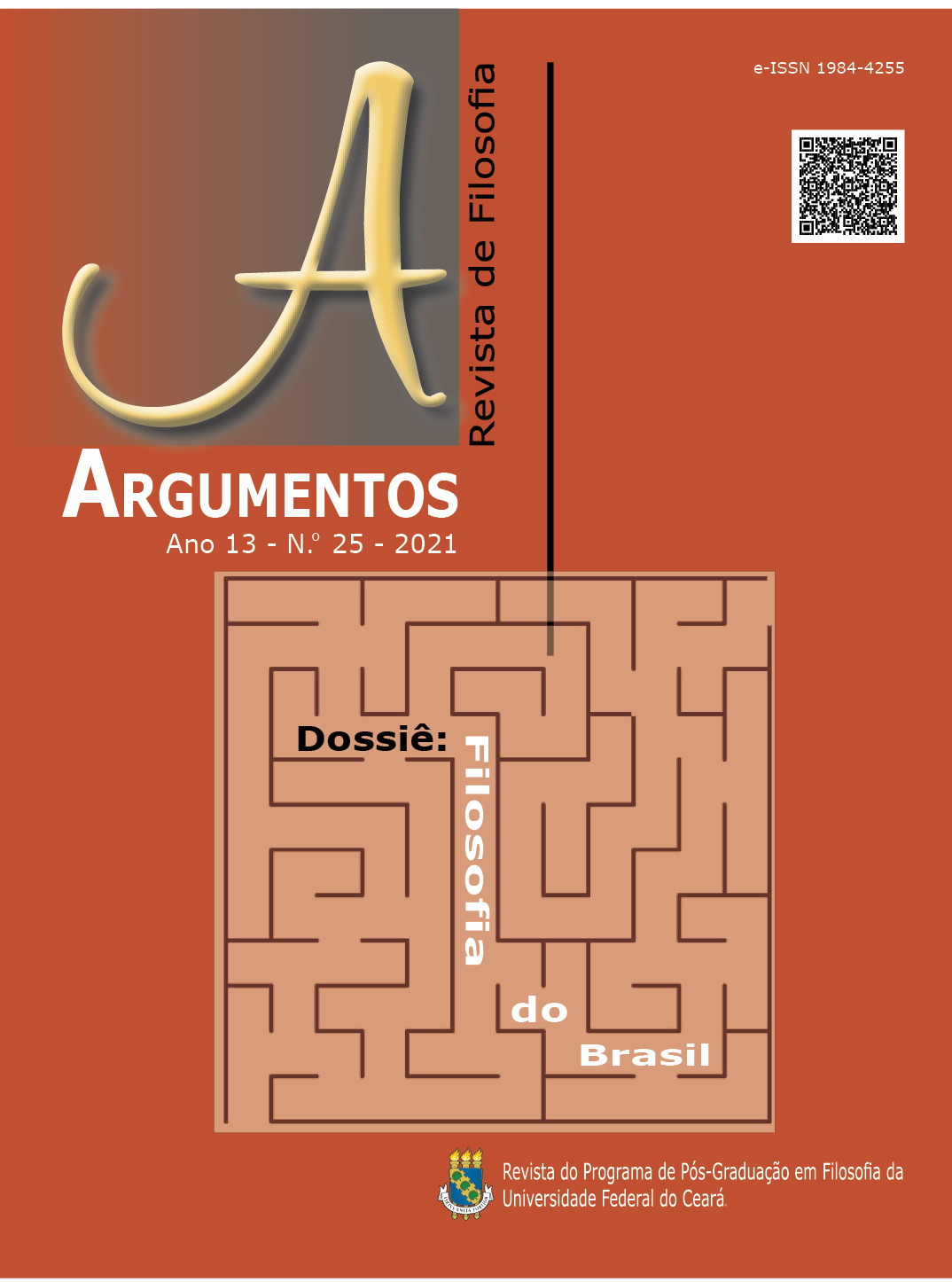Ways of thinking: methodological contributions to the brazilian philosophy
DOI:
https://doi.org/10.36517/Argumentos.25.7Keywords:
Brazilian philosophy. Originality. Methodologies. Ways of thinking.Abstract
Why there wouldn’t be a Brazilian philosophy? Here is the question that has motivated us for a long time and led us to the identification of some paradigms below. As we have meditated about it, we have glimpsed new scenarios and perspectives that are possible in the elaboration of some answer to it. At this moment, we don’t offer an answer. We only list possible paradigms that are understanding about the originality of a Brazilian philosophy, as follows, a characterizing of postures: affirmative, negative, historiographical, literary and philosophical, university philosophy, primitive knowledge, libertarian praxis, philosophies of foreign ways of thinking, interpreters of Brazil, metaphilosophy and philosophy of the ways of thinking. This characterizing is not found in most authors that were mentioned, but we formulated it as a pre-understanding of a broader work that we are developing around the Brazilian philosophical methodologies and, partly, also Latin American, whose focus will be to respond the initial question. Two precedent proposals were present at the IESMA and UFOP. Our task is to investigate the cohe-rence and utility of these paradigms as a pretext to the question: what is Brazilian philosophy?
References
ARANTES, P. Um departamento francês de ultramar. Rio de Janeiro: Paz e Terra, 1994.
ASSIS, M. Contos 3: Filosofia. Organização e introdução de J. Rocha. Rio de Janeiro: Record, 2008.
BORNHEIM, G. A. O idiota e o espírito objetivo. 2. ed. Rio de Janeiro: UAPÊ, 1998.
CORNELLI, G. “Calcular a saúde”. Em: PEIXOTO, M. (Org.). A saúde dos antigos. São Paulo: Loyola, 2009.
DUSSEL, E.; MENDIETA, E.; BOHÓRQUEZ, C. (Ed.) El pensamiento filosófico latino-americano, del Caribe y “latino” [1300-2000]. Mexico: Siglo XXI, 2009.
GOMES, R. Crítica da razão tupiniquim. 12. ed. Curitiba: Criar, 2001.
LEITE, S. História da Companhia de Jesus no Brasil, VII. Belo Horizonte: Itatiaia, 2006.
MARGUTTI, P. História da filosofia do Brasil (1500-1822). São Paulo: Loyola, 2013.
MARQUES, L. A. A lógica da necessidade. Porto Alegre: Fi, 2018.
MARQUES, L. A. Philosophia brasiliensis. Porto Alegre: Fi, 2015.
NUNES, B. Ensaios filosóficos. Organização de V. S. Pinheiro. São Paulo: Martins Fontes, 2010.
REDMOND, W. B. Bibliography of the Philosophy in the Iberian Colonies of America. Netherlands: Martins Nijhoff; The Hague, 1972.
ROMERO, S. História da literatura brasileira. Tomo I. Organização de L. A. Barreto. Rio de Janeiro: Imago e Sergipe: UFS, 2001.
SILVEIRA, R. A. T. A brasileiríssima filosofia brasileira. Síntese, v. 43, n. 136, 2016. p. 261-278.
STRAUSS, A. et al. The Oldest Case of Decapitation in the New World. In: Plosone. September 23, 2015. p. 1-31. Disponível em https://journals.plos.org/plosone/ article?id=10.1371/journal.pone.0137456. Acesso em: 25 mar. 2020.
VAINFAS, R. (Org.) Dicionário do Brasil Colonial. Rio de Janeiro: Objetiva, 2001.
VAZ, H. C. L. O problema da filosofia no Brasil. Síntese, v. 30, 1984. p. 11-25.
VITA, L. W. Panorama da filosofia no Brasil. Porto Alegre: Globo, 1969.
ZEA, L. La filosofía americana como filosofía sin más. 13. ed. México: Siglo XXI, 1989.
ZIMMERMANN, R. América Latina: o não-ser. Petrópolis: Vozes, 1987.
Downloads
Published
Issue
Section
License
Argumentos magazine is licensed under an International Creative Commons Attribution License.
The Magazine uses CC BY inclusion
1) The authors retain the copyright granted to the magazine or the right to initial publication, with the work regularly licensed under the Creative Commons Attribution, which allows the sharing of the work with acknowledgment of authorship and initial publication in this magazine.
2) The authors are authorized to contract additional applicable contracts, for non-exclusive distribution of the version of the work published in this journal (for example, publication in the institutional repository or as a chapter of the book), recognition of authorship and initial publication in this journal.
3) Authors are authorized and encourage to publish and distribute their work online (for example, in institutional repositories or on their personal pages) at any time before or during the editorial process, as they can generate productive changes, as well as increase the impact and reference of published work.




.jpg)










._._3.png)
1.jpg)
._._._.png)
